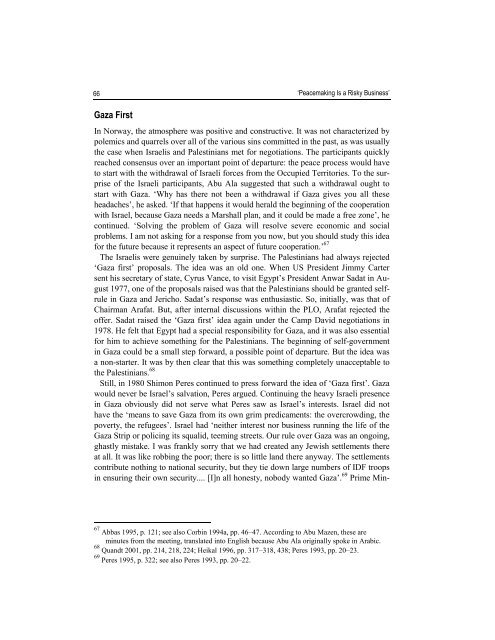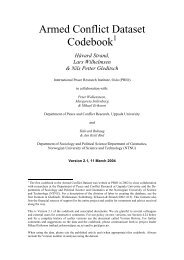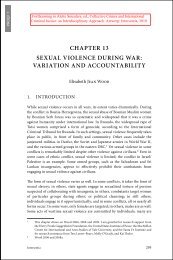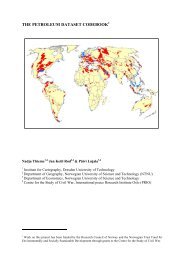Peacemaking Is a Risky Business - PRIO
Peacemaking Is a Risky Business - PRIO
Peacemaking Is a Risky Business - PRIO
You also want an ePaper? Increase the reach of your titles
YUMPU automatically turns print PDFs into web optimized ePapers that Google loves.
66 ‘<strong>Peacemaking</strong> <strong>Is</strong> a <strong>Risky</strong> <strong>Business</strong>’Gaza FirstIn Norway, the atmosphere was positive and constructive. It was not characterized bypolemics and quarrels over all of the various sins committed in the past, as was usuallythe case when <strong>Is</strong>raelis and Palestinians met for negotiations. The participants quicklyreached consensus over an important point of departure: the peace process would haveto start with the withdrawal of <strong>Is</strong>raeli forces from the Occupied Territories. To the surpriseof the <strong>Is</strong>raeli participants, Abu Ala suggested that such a withdrawal ought tostart with Gaza. ‘Why has there not been a withdrawal if Gaza gives you all theseheadaches’, he asked. ‘If that happens it would herald the beginning of the cooperationwith <strong>Is</strong>rael, because Gaza needs a Marshall plan, and it could be made a free zone’, hecontinued. ‘Solving the problem of Gaza will resolve severe economic and socialproblems. I am not asking for a response from you now, but you should study this ideafor the future because it represents an aspect of future cooperation.’ 67The <strong>Is</strong>raelis were genuinely taken by surprise. The Palestinians had always rejected‘Gaza first’ proposals. The idea was an old one. When US President Jimmy Cartersent his secretary of state, Cyrus Vance, to visit Egypt’s President Anwar Sadat in August1977, one of the proposals raised was that the Palestinians should be granted selfrulein Gaza and Jericho. Sadat’s response was enthusiastic. So, initially, was that ofChairman Arafat. But, after internal discussions within the PLO, Arafat rejected theoffer. Sadat raised the ‘Gaza first’ idea again under the Camp David negotiations in1978. He felt that Egypt had a special responsibility for Gaza, and it was also essentialfor him to achieve something for the Palestinians. The beginning of self-governmentin Gaza could be a small step forward, a possible point of departure. But the idea wasa non-starter. It was by then clear that this was something completely unacceptable tothe Palestinians. 68Still, in 1980 Shimon Peres continued to press forward the idea of ‘Gaza first’. Gazawould never be <strong>Is</strong>rael’s salvation, Peres argued. Continuing the heavy <strong>Is</strong>raeli presencein Gaza obviously did not serve what Peres saw as <strong>Is</strong>rael’s interests. <strong>Is</strong>rael did nothave the ‘means to save Gaza from its own grim predicaments: the overcrowding, thepoverty, the refugees’. <strong>Is</strong>rael had ‘neither interest nor business running the life of theGaza Strip or policing its squalid, teeming streets. Our rule over Gaza was an ongoing,ghastly mistake. I was frankly sorry that we had created any Jewish settlements thereat all. It was like robbing the poor; there is so little land there anyway. The settlementscontribute nothing to national security, but they tie down large numbers of IDF troopsin ensuring their own security.... [I]n all honesty, nobody wanted Gaza’. 69 Prime Min-67 Abbas 1995, p. 121; see also Corbin 1994a, pp. 46–47. According to Abu Mazen, these areminutes from the meeting, translated into English because Abu Ala originally spoke in Arabic.68 Quandt 2001, pp. 214, 218, 224; Heikal 1996, pp. 317–318, 438; Peres 1993, pp. 20–23.69 Peres 1995, p. 322; see also Peres 1993, pp. 20–22.
















